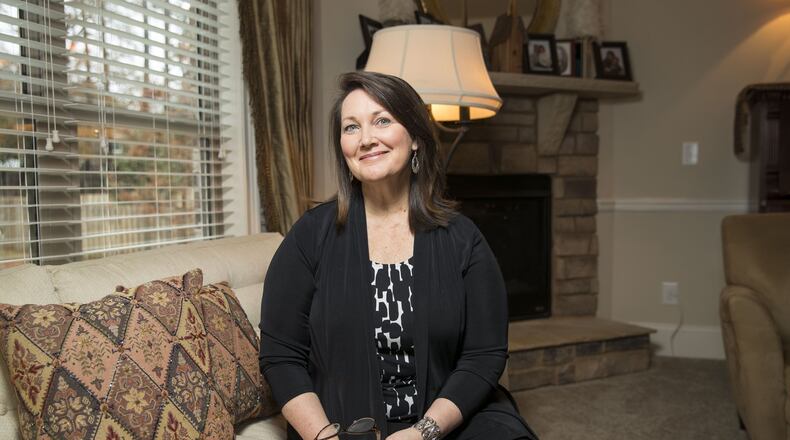Moving to Clayton County has freed Bonnie Shekarabi.
After decades living on Atlanta's northside in south Forsyth County, Shekarabi and her husband moved south to Jonesboro in 2014 to get away from traffic congestion, save money on housing and have better access to Hartsfield-Jackson International Airport, concerts in Midtown and shopping at Tanger Outlets in Locust Grove.
“The access to highway systems was just unbelievable,” Shekarabi said of adjusting to living in Clayton, where she found a 3,800-square-foot home for half the price per square foot that she sold her former home for. “We had access to highways from our home near John’s Creek, but you had to go through a whole lot of suburbs to get there. And by the time you arrived, they would be so clogged it would take forever. We felt very liberated.”
Almost a decade after it became ground zero for the region’s sub-prime lending and logged some of metro Atlanta’s highest foreclosure rates, Clayton County is slowing becoming a residential destination, real estate experts and county officials say. Homeowners looking for alternatives to gridlock on metro Atlanta’s highways and surging home prices on the city’s more prosperous northside are taking tours of the county with Realtors while developers are bidding to restart housing projects abandoned when the economy went south in 2008.
RELATED | Economy healed, but Atlanta's scars from recession remain
Clayton’s resurgence is important because it’s an indicator that metro Atlanta’s overall residential real estate market continues to boom, said John Hunt, the principal of MarketNSight and president of data firm ViaSearch. With prices of new and existing homes in Atlanta and Gwinnett, Cobb and North Fulton counties soaring because of tight availability, many buyers are looking at secondary markets such as Clayton, Paulding and Hall as the next best thing.
“Atlantans are pushing out again because of price,” he said. “But it’s in second-tier counties. It’s still very inexpensive to live in Clayton.”
The average price of a new home in metro Atlanta this year was $324,849 compared to $187,525 in Clayton, Hunt said. For Clayton, that sell price was a vast improvement over 2012 when the average price of a new dwelling was $81,275 and existing homes were selling for just over $41,000.
Clayton is trying to capitalize on the changes. The county is changing zoning laws to encourage developers to build homes in the range of $230,000 and up to offer a more diverse housing stock. It also is collaborating with the Aerotropolis Atlanta Alliance — a business group focusing on promoting development around Hartsfield-Jackson — on bus tours of the county to show developers and real estate agents opportunities to bring in new residents.
But the county has hurdles to overcome. It faces a number of issues, including perceptions of high crime, lack of amenities and a troubled school system because the district lost its accreditation in 2008, mostly due to infighting among board members. Despite regaining most of its accredited status in 2013, the perception of bad schools persists, much to the chagrin of Clayton Commission Chairman Jeff Turner.
“We have a good school system, contrary to popular belief,” he said, explaining the district has a new superintendent and grades are improving.
Detrick Stanford, the county's chief operating officer, said Clayton also is trying to lure high-paying jobs to keep homeowners from driving north to Atlanta for work. As much as half of Clayton's most high-skilled workers commute north daily because they can't find jobs in the county that match their abilities and pay standards. In addition, the county is developing training programs to boost the capabilities of the remaining residents to match the needs of high-paying employers.
“It does us no good to bring high-tech jobs or whatever else and not have a citizenry that has the skillset to compete for those jobs,” Turner said.
The county also is hoping to turn renters into homeowners. As many as 42 percent of the county's population rents their homes, one of the highest rental rates in the metro area, Clayton officials said. That, however, is a decrease from a decade ago when the rental rate reached as high as 60 percent. An Atlanta Journal-Constitution special report in 2016 found that many of the rental properties were owned by investors that purchased property at deep discounts during the recession.
Paris Taylor, a Realtor with Berkshire Hathaway, said she has seen an uptick in clients considering Clayton County as their new home. House hunters, unable to afford Atlanta dwellings starting at $500,000 and up, like that Clayton offers homes in the $200,000 range. Another lure is MARTA, which began offering bus service to the county in 2015.
“We have more people coming in who are interested in buying in this area because it is so greatly located,” she said “This is where people are starting to look.”
Keeping the county on track requires diligence, said Ricky Clark, Jonesboro’s city manager. For instance, Clark said at least seven developers have proposed finishing a 50-home Jonesboro development dubbed The Grove that had stalled during the recession. The city has been non-committal as it looks for a developer who shares its vision of better build quality for Clayton homes.
“My philosophy is, ‘If the land has been vacant this long, you’re not going to give us a shotgun house,’” Clark said. “We’re not going to approve that.”
Tashina Hamilton, who moved to the Lake Spivey area in Clayton two years ago from South Carolina, wanted to live somewhere that reminded her of home. She looked in Henry County and other parts of metro Atlanta, but she was drawn to Lake Spivey because of its golf courses, trails and well-built homes.
“I immediately fell in love with the house because it felt familiar and looked like home,” she said of the golf community. “Aesthetically it was all the things I needed. There was shopping, food and I was out of the hustle and bustle.”
She acknowledged that Clayton County has a sullied reputation among some, but she couldn't be happier with her choice. Hamilton, who has an 8-year-old daughter, said the county has improved school quality and that investments in parks, recreation and walking trails are raising quality of life standards.
“The Jonesboro area just seems a lot less congested and spread out than the rest of metro Atlanta,” she said. “It just feels right.”
After years of struggling to shake off the recession, residential home prices in Clayton County are rebounding. The average price of a new home was more than $180,00 in 2017, compare to just over $81,000 five years ago. The price increase, however, still lag behind metro Atlanta’s average home price of more than $324,000.
MYAJC.COM: REAL JOURNALISM. REAL LOCAL IMPACT.
The AJC's Leon Stafford keeps you updated on the latest happenings around metro Atlanta's Southside area. You'll find more on myAJC.com, including these stories:
Never miss a minute of what's happening in local politics. Subscribe to myAJC.com.
2012 average price of new Clayton home: $81,275
2012 average price of new metro Atlanta home: $185,831
2017 average price of new Clayton home: $187,525
2017 average price of new metro Atlanta home: $324,849
New home sales growth rate in Clayton: up 40 percent
Source: MarketNsight
About the Author
Keep Reading
The Latest
Featured


